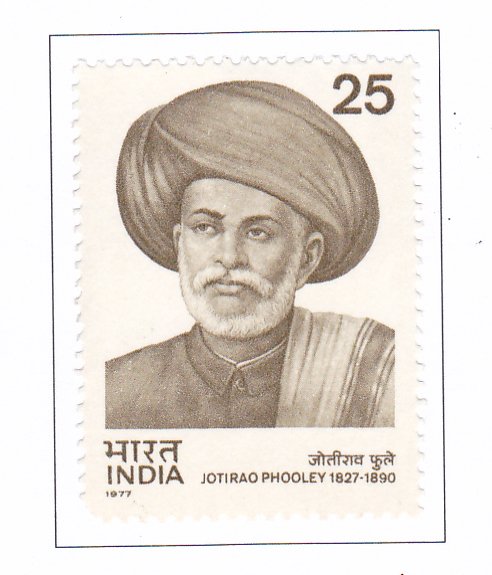Jotirao Phooley (1827-1890)

Technical Data
| Stamp Set | Personality Series |
|---|---|
| Date of Issue | November 28, 1977 |
| Denomination | 25 p |
| Quantity | 3,000,000 |
| Perforation | comb 13 |
| Printer | Security Printing Press, Nashik |
| Watermark | Asokan Capital Multiple [SL] |
| Colors | Olive brown |
| Catalog Codes |
Michel IN 742 Stamp Number IN 779 Yvert et Tellier IN 539 Stanley Gibbons IN 869 |
| Themes | Authors | Famous people | Headgear | Men | Reformers |
Jotirao Phooley, born in Pune in 1827 to Govindrao and Chimnabai, hailed from a humble background. Despite his family’s modest means, he embarked on his educational journey at the age of seven, attending a Marathi school before progressing to a Scottish Mission School, where he completed his studies in 1847.
From a young age, Jotirao was characterized by his dynamism and fervor. He found inspiration in the tales of heroism of figures like Shivaji and George Washington, as well as in the ideas presented in Thomas Paine’s “Rights of Man.” Motivated by their examples, he resolved to dedicate his life to the cause of liberating the oppressed from the chains of bondage.
In 1848, Phule took a significant step by establishing a school that welcomed ‘untouchables’ and girls, defying considerable opposition. This act was part of his broader crusade against the caste system. In 1833, he founded the Satya-Shodhak Samaj, an organization aimed at spreading the message of emancipation for the exploited masses and advocating for the rights of women.
Phule also advocated for the improvement of conditions for Indian peasants, driven by his unwavering belief in the principle of “Truth Alone Triumphs.” His life’s work was dedicated to challenging oppressive systems and championing the cause of social justice.
Jotirao Phule passed away on November 28, 1890, leaving behind a legacy of activism, education, and advocacy for the marginalized and oppressed in society.
